Table of Contents
Get started with MyPerfectResume today!
- Build a resume on any device
- Pick an ATS-friendly template
- Tailor with AI copy suggestions
Why this resume works
- Quantifies accomplishments: By listing quantified accomplishments like achieving a 15% improvement in patient recovery times, the applicant showcases their ability to deliver measurable impact.
- Uses action-oriented language: Action verbs like “monitored,” “conducted,” and “developed” reflect a proactive approach that drives effectiveness and decisiveness.
- Illustrates problem-solving ability: Reducing infection rates by 12% highlights critical thinking and innovation in healthcare solutions, demonstrating problem-solving expertise.
More Hemodialysis Nurse Resume Examples
These hemodialysis nurse resume examples highlight patient care, teamwork, and technical skills. Use these samples as a guide to create a strong resume that showcases your expertise and dedication in the healthcare field.
Entry-level hemodialysis nurse
Why this resume works
- Puts skills at the forefront: By positioning key abilities prominently, the applicant adopts a skills-based resume format that effectively spotlights competencies like renal care management and team training.
- Effective use of keywords: Using targeted terms such as “hemodialysis treatment” and “patient satisfaction” throughout the resume is a clever way to incorporate keywords to navigate ATS filters successfully.
- Centers on academic background: Showcasing advanced degrees from reputable institutions, the education section emphasizes academic prowess—an essential strategy for those at the start of their career journey.
Mid-level hemodialysis nurse
Why this resume works
- Includes a mix of soft and hard skills: By mixing technical expertise in dialysis with interpersonal skills, the applicant fosters effective team leadership and patient care improvement.
- Points to measurable outcomes: The applicant’s initiatives, like reducing treatment time by 15%, reflect a knack for delivering measurable outcomes that improve healthcare efficiency.
- Demonstrates language abilities: Language skills in Spanish, French, and Mandarin help the applicant facilitate better cross-cultural communication, enriching patient interactions in diverse settings.
Experienced hemodialysis nurse
Why this resume works
- Lists relevant certifications: Listing certifications like Certified Nephrology Nurse and Basic Life Support reflects a commitment to expertise and continuous learning.
- Showcases impressive accomplishments: Achievements such as improving patient satisfaction by 15% annually highlight senior-level performance.
- Emphasizes leadership skills: Managing dialysis units with 95% efficiency and mentoring staff illustrates strong leadership skills through effective team supervision and guidance.
Hemodialysis Nurse Resume Template (Text Version)
David Nguyen
Pinehill, TX 75757
(555)555-5555
David.Nguyen@example.com
Professional Summary
Dedicated Hemodialysis Nurse with 8 years of experience in dialysis treatment, patient care education, and health outcome improvements. Proven record in enhancing patient recovery.
Work History
Hemodialysis Nurse
Harmony Health Center – Pinehill, TX
September 2022 – August 2025
- Monitored dialysis treatments for 30+ patients weekly
- Educated patients on dialysis treatment plans
- Achieved 15% improvement in patient recovery times
Renal Nurse Specialist
Riverside Medical Group – Austin, TX
September 2019 – August 2022
- Conducted pre-dialysis assessments for 50+ new patients
- Enhanced patient health outcomes by 20%
- Developed individualized treatment plans
Registered Nurse – Dialysis
Greenfield Hospital – Pinehill, TX
September 2017 – August 2019
- Administered dialysis to over 200 patients monthly
- Reduced infection rates by 12%
- Provided detailed patient care documentation
Skills
- Dialysis treatment management
- Patient education
- Pre-dialysis assessments
- Individualized care plans
- Health outcome improvements
- Infection prevention
- Patient care documentation
- Medical record keeping
Education
Master’s of Science in Nursing Nursing
University of Rhode Island Kingston, RI
June 2017
Bachelor’s of Science in Nursing Nursing
Boston University Boston, MA
June 2015
Certifications
- Certified Nephrology Nurse – Nephrology Nursing Certification Commission
- Advanced Cardiac Life Support – American Heart Association
- Basic Life Support – American Heart Association
Languages
- Spanish – Beginner (A1)
- French – Beginner (A1)
- German – Beginner (A1)
Related Resume Guides
- Geriatric Nurse Practitioner
- Intensive Care Nurse
- Labor And Delivery Nurse
- Licensed Practical Nurse
- Neonatal Intensive Care Unit Nurse
- Neonatal Nurse
- Nurse Aide
- Nurse Care Coordinator
- Nurse Practitioner
- Nursing Assistant
- Obgyn Nurse
- Oncology Nurse
- Operating Room Nurse
- Pediatric Nurse
- Perioperative Nurse
- Pre Post Op Nurse
- Private Duty Nurse
- Registered Nurse
- School Nurse
- Trauma Nurse
Advice for Writing Your Hemodialysis Nurse Resume
Learn how to write a resume tailored for hemodialysis nurses, highlighting your specialized skills and passion for providing life-saving care to stand out in the healthcare industry.
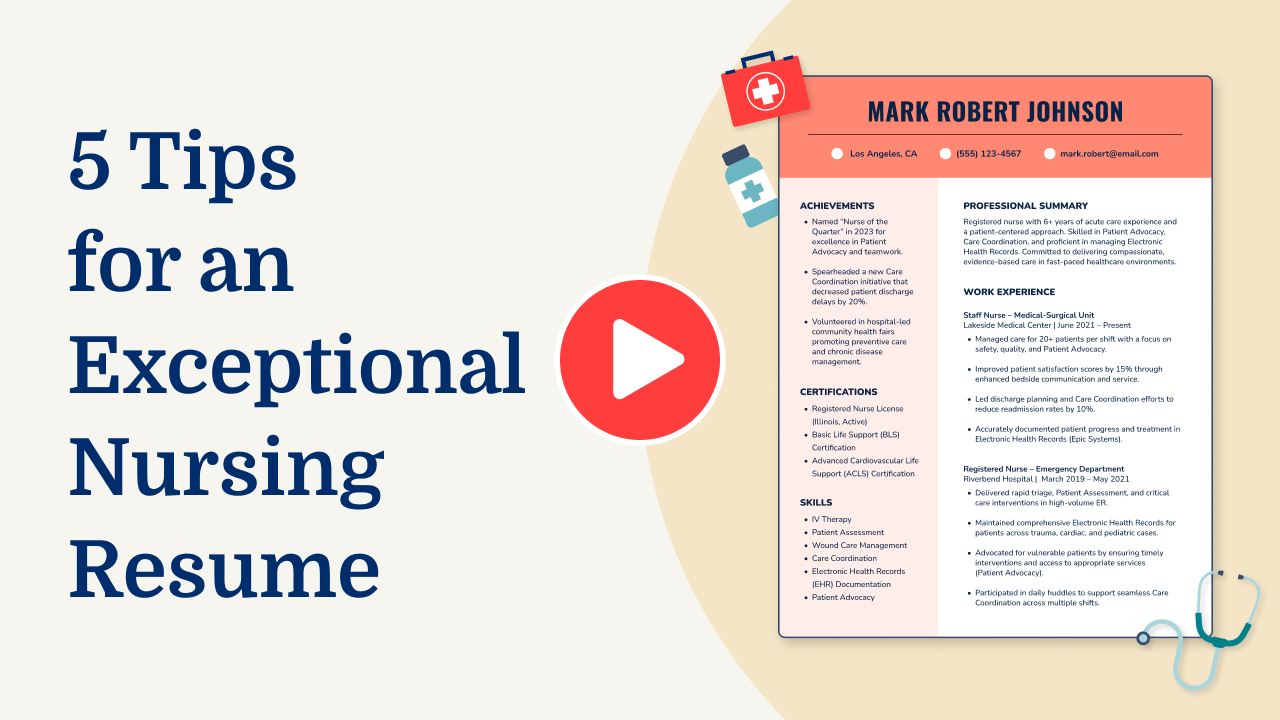
Write a strong professional summary
A professional summary on a resume serves as an introduction to hiring managers, offering them a quick glimpse into your skills and achievements. As the first section they read, it helps them decide if they should continue reviewing your application. When crafting this section, you first need to choose between writing a summary or an objective.
A professional summary is typically three to four sentences that highlight your experience, skills, and achievements. It works best for those who are experienced in their field, like hemodialysis nurses with several years of practice. Its purpose is to clearly present your professional identity and the value you bring to potential employers.
In contrast, resume objectives state career goals and are suitable for entry-level applicants, career changers, or those with employment gaps. While a summary focuses on “what I’ve accomplished,” an objective emphasizes “what I aim to contribute.”
Next, let’s go through examples of both summaries and objectives tailored for various experience levels to help guide you in creating an effective resume introduction.
Hemodialysis nurse resume summary examples
Entry-level
Newly graduated hemodialysis nurse with a Bachelor of Science in Nursing from an accredited university and certification as a Registered Nurse (RN). Completed clinical rotations in nephrology units, gaining foundational skills in patient care and dialysis procedures. Committed to delivering compassionate care and eager to apply knowledge in a team-oriented environment.
Mid-career
Skilled hemodialysis nurse with over six years of experience providing direct patient care in hospital and outpatient dialysis centers. Proficient in operating dialysis equipment, monitoring vital signs, and managing treatment plans for patients with chronic kidney disease. Recognized for excellent patient education and collaboration with multidisciplinary teams to ensure quality care.
Experienced
Seasoned hemodialysis nurse with over 15 years of expertise in renal healthcare management, including leadership roles such as charge nurse. Certified in advanced cardiac life support (ACLS) and known for implementing process improvements that improve patient outcomes. Expert at training nursing staff on best practices and fostering a culture of empathy and excellence within the unit.
Hemodialysis nurse resume objective examples
Recent graduate
Compassionate and dedicated recent nursing graduate seeking an entry-level hemodialysis nurse position to use clinical skills and foundational knowledge in renal care. Committed to providing excellent patient support and learning advanced dialysis techniques in a collaborative healthcare environment.
Career changer
Detail-oriented professional transitioning into the role of hemodialysis nurse, with a background in patient advocacy and care coordination. Eager to leverage transferable skills and newly acquired knowledge in nephrology nursing to deliver quality care and improve patient experiences.
Specialized training
Nursing graduate with specialized training in renal care techniques seeking a position as a hemodialysis nurse. Passionate about applying hands-on clinical experience gained through intensive coursework and internships to support patients’ kidney health and treatment plans effectively.
Craft a standout resume with ease! Our AI Resume Builder offers templates designed to highlight your skills as a hemodialysis nurse, making it simple to impress hiring managers.
Include relevant certifications and training
Certifications and training are important for a hemodialysis nurse because they show you have the needed skills and knowledge to care for patients safely. These credentials prove that you are up to date with the latest practices in dialysis care.
They also help you stand out when applying for jobs, as employers look for nurses who have specialized training. Having a dedicated section for certifications on your resume makes it easy for hiring managers to see your qualifications at a glance. Beneficial certifications for hemodialysis nurses include:
- Certified Nephrology Nurse (CNN)
- Basic Life Support (BLS) Certification
- Advanced Cardiovascular Life Support (ACLS) Certification
- Certified Dialysis Nurse (CDN)
- Pediatric Advanced Life Support (PALS)
Listing these certifications can make your resume stronger by showing that you are committed to providing quality patient care as a hemodialysis nurse. They demonstrate your dedication to learning and being prepared for emergencies. This can give employers confidence in your abilities during the hiring process.
Example of a certifications section
Certified Dialysis Nurse (CDN)
Issued by: Nephrology Nursing Certification Commission (NNCC)
Basic Life Support (BLS) Certification
Issued by: American Heart Association
Advanced Cardiovascular Life Support (ACLS) Certification
Issued by: American Heart Association
For nursing roles, choose a resume template with a simple, professional design rather than an overly decorative one. This approach ensures you present a polished image that can set you apart.
Showcase your work experience
Showcasing relevant work experience on a resume is important for demonstrating your qualifications as a hemodialysis nurse. Employers want to see how your past roles align with their needs, so it’s important to format this section clearly and in reverse-chronological order.
Begin with your most recent position and include the job title, employer name, location, and dates of employment. Using clear, action-oriented language helps convey your impact in previous roles while focusing on measurable achievements.
When describing responsibilities, emphasize tasks specific to hemodialysis nursing, such as:
- Managing dialysis equipment
- Monitoring patient vitals during treatment
- Educating patients about their care plans
- Collaborating with healthcare teams.
Include examples of outcomes where possible. For instance:
- Improving patient comfort
- Ensuring accurate documentation during procedures
- Reducing wait times for patients
- Increasing efficiency in dialyzer preparation
Use bullet points or short sentences for easy scanning of information. Always tailor descriptions to highlight how your skills match the requirements of a hemodialysis nurse role while showcasing both technical expertise and compassionate care delivery in previous positions.
5 hemodialysis nurse work history bullet point examples
- Administered over 300 hemodialysis treatments monthly, improving patient recovery rates by 15%.
- Developed a patient education program that increased treatment adherence by 25% among new patients.
- Collaborated with a multidisciplinary team to improve care plans, resulting in a 20% reduction in hospital readmissions.
- Led quality improvement initiatives that decreased treatment complications by 12% through improved monitoring protocols.
- Trained and mentored four junior nurses, boosting team efficiency and reducing onboarding time by 30%.
Highlight your skills and experience in patient care by choosing a resume format that showcases your expertise and dedication as a hemodialysis nurse.
Match your resume with the job description
Tailoring your resume to the job description is important because it helps you highlight your most relevant skills and experiences, making you stand out to employers. It also ensures your resume passes through applicant tracking systems (ATS), which scan for specific keywords and phrases found in job postings. Consider creating an ATS-friendly resume to improve your visibility.
An ATS-friendly resume uses terms directly from the job description to connect the applicant’s skills with the employer’s needs. By incorporating these keywords naturally, you can improve your chances of catching the attention of hiring managers.
To identify keywords, review the job posting thoroughly for repeated skills, qualifications, and responsibilities. For a hemodialysis nurse role, look for terms like “patient care,” “monitoring treatments,” or “team collaboration.” Using exact phrases from the posting increases alignment with what employers are seeking.
When adding keywords into your resume, rewrite descriptions in ways that feel natural. For example, instead of copying “Provide high-quality patient care,” you could say “Delivered exceptional patient care during dialysis treatments to improve health outcomes.” This approach ties your experience closely to the employer’s needs.
Targeted resumes increase compatibility with ATS systems while demonstrating that you’ve carefully tailored your application for the role. Make sure you customize your resume thoughtfully to move closer to an interview opportunity.
Make sure your resume gets noticed! Our ATS Resume Checker checks if your resume is set up correctly and has the right keywords so it won’t be rejected by ATS software.
FAQ
Do I need to include a cover letter with my hemodialysis nurse resume?
Including a well-written nursing cover letter with your resume can help you stand out from other applicants and secure more interviews.
A cover letter allows you to personalize your application by sharing your specific interest in the position and facility, elaborating on relevant experience, and showcasing your patient care skills.
If the hospital or clinic has a unique program, specialty, or unit, you can elaborate on your interest or experience in that area.
You can use our Cover Letter Generator to create a cover letter based on your resume or develop a brand-new one with step-by-step guidance and expert content suggestions.
We also recommend referencing our library of cover letter examples for samples tailored to various industries and career levels.
How long should a hemodialysis nurse resume be?
For a hemodialysis nurse, a one-page resume is often sufficient to highlight your core competencies, such as patient care expertise and familiarity with dialysis procedures.
If you’ve amassed extensive experience or possess unique certifications like nephrology nursing credentials, opting for a two-page resume might be appropriate. Explore our guide on how long a resume should be for examples and tips on determining the ideal length based on your career stage and accomplishments.
It’s important that every detail included directly pertains to your ability to provide exceptional care and operate specialized medical equipment.
How do you write a hemodialysis nurse resume with no experience?
If you’re crafting a resume with no experience for a hemodialysis nurse position, emphasize your education, certifications, and transferable skills that fit the job. Here’s an effective way to organize your resume content.
- Showcase your nursing degree and licensure: Start with your nursing degree, including the institution, graduation date, and any honors. Clearly list your RN license details and relevant certifications like BLS (Basic Life Support) or ACLS (Advanced Cardiovascular Life Support).
- Leverage clinical rotations: Highlight clinical rotations that involved dialysis or kidney care. Detail the procedures you observed or assisted with, patient care responsibilities, and collaboration with medical teams.
- Add transferable skills: Include soft skills like communication, attention to detail, and teamwork, which are essential for hemodialysis nurses. If you’ve volunteered in healthcare settings or worked in roles requiring patient interaction, incorporate these experiences too.
For more tips on crafting a strong resume with no experience, consider examples and advice tailored to entry-level healthcare professionals.
Rate this article
Hemodialysis Nurse
Share this page
Additional Resources
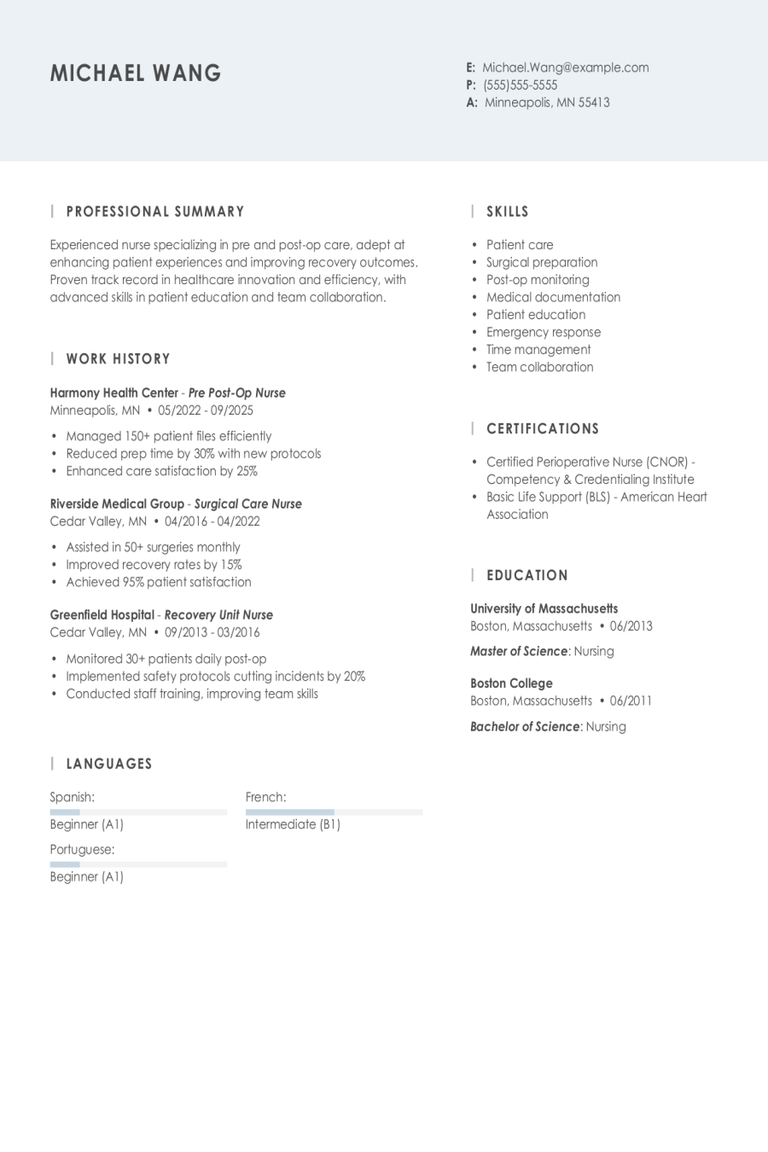
Pre Op/Post Op Nurse Resume Examples & Templates
These pre op/post op nurse resume examples show how to highlight your skills in patient care and surgical prep. Learn tips for showcasing your experience and making your qualifications stand
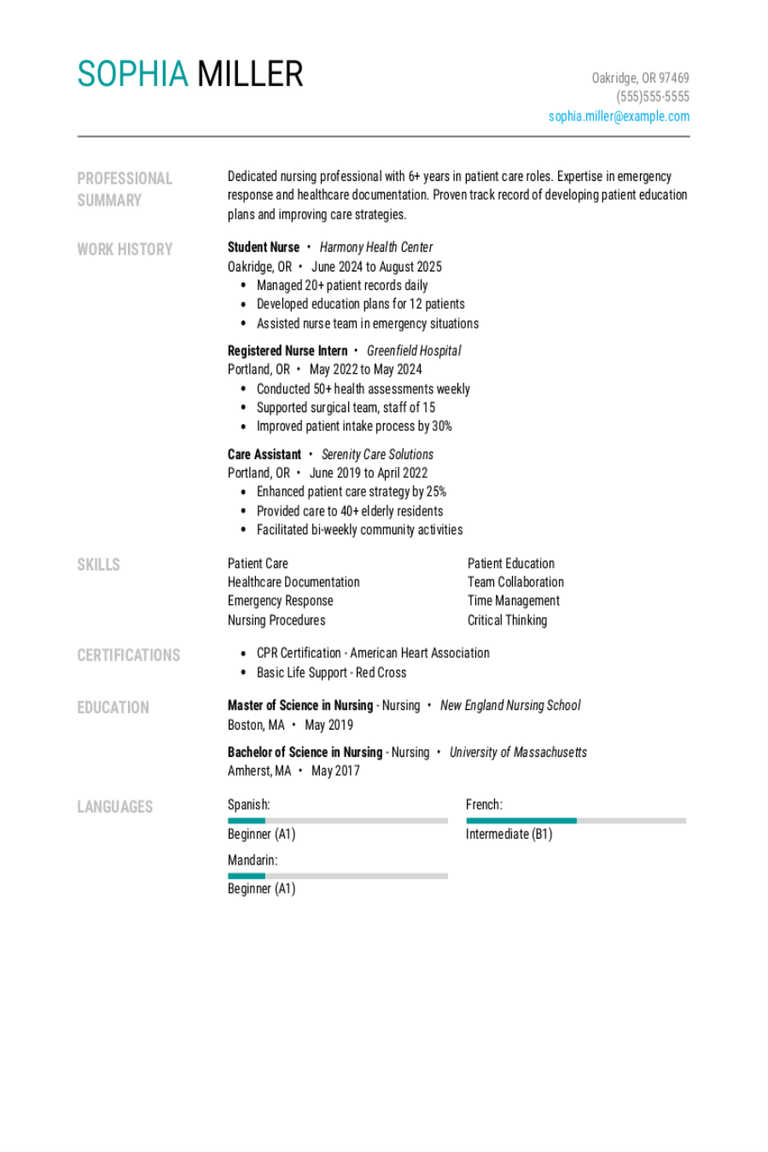
Student Nurse Resume Examples & Templates
Discover student nurse resume examples that show off patient care, teamwork, and time management. Learn how to present your skills and experiences to stand out in the healthcare field.Build my
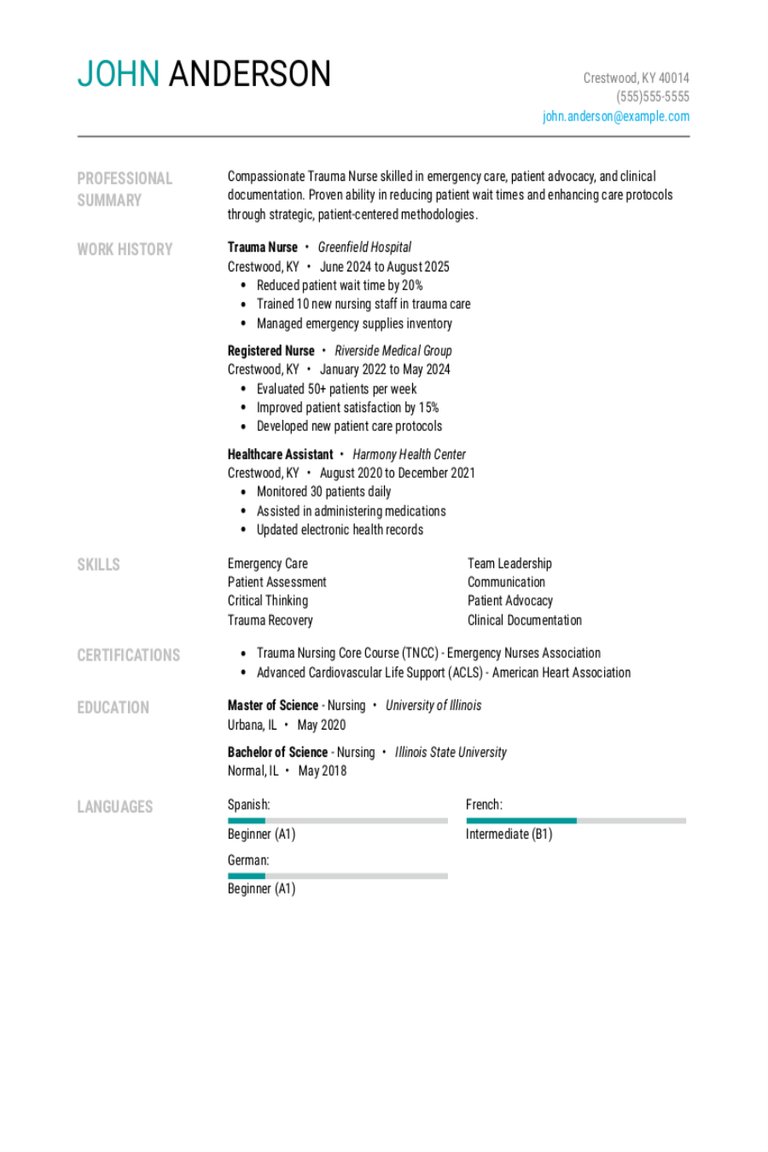
Trauma Nurse Resume Examples & Templates
Explore trauma nurse resume examples that showcase how to present your emergency care skills and experience clearly. Our tips will help you highlight your fast-paced decision-making and patient care abilities
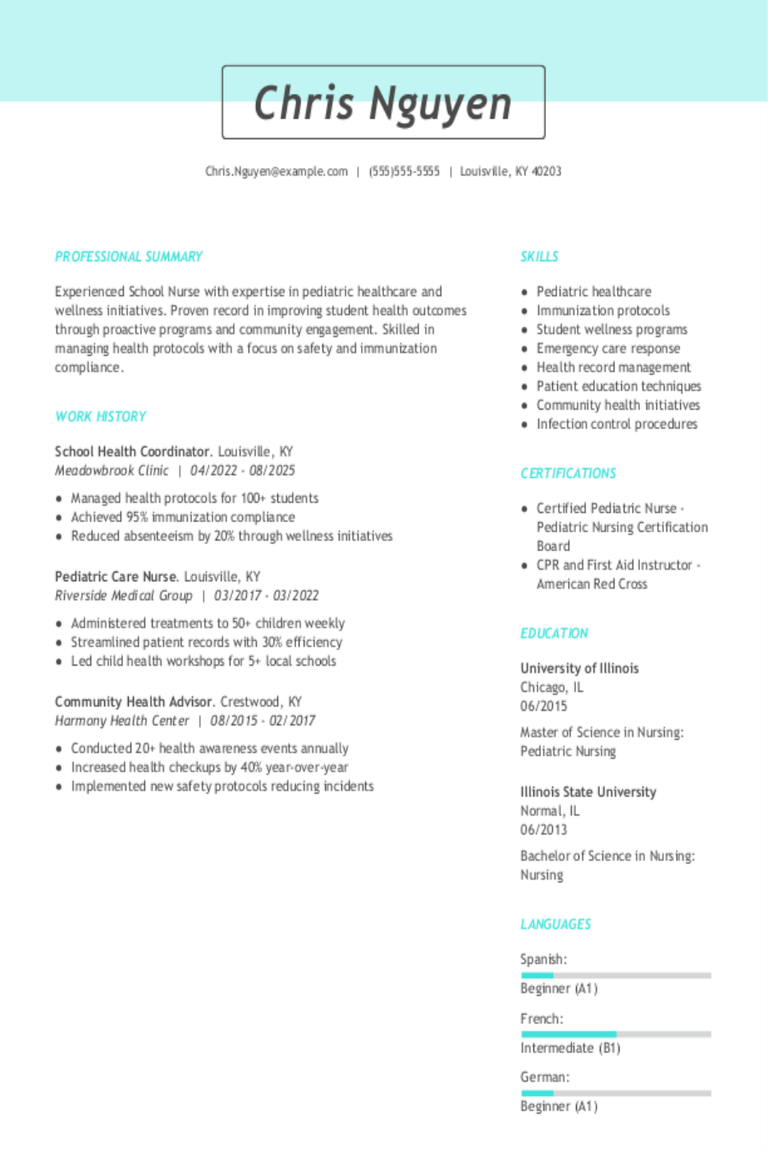
School Nurse Resume Examples & Templates
As a school nurse, your resume must show how you care for students, manage health records, and handle emergencies. Use our samples to see how to highlight your compassion and
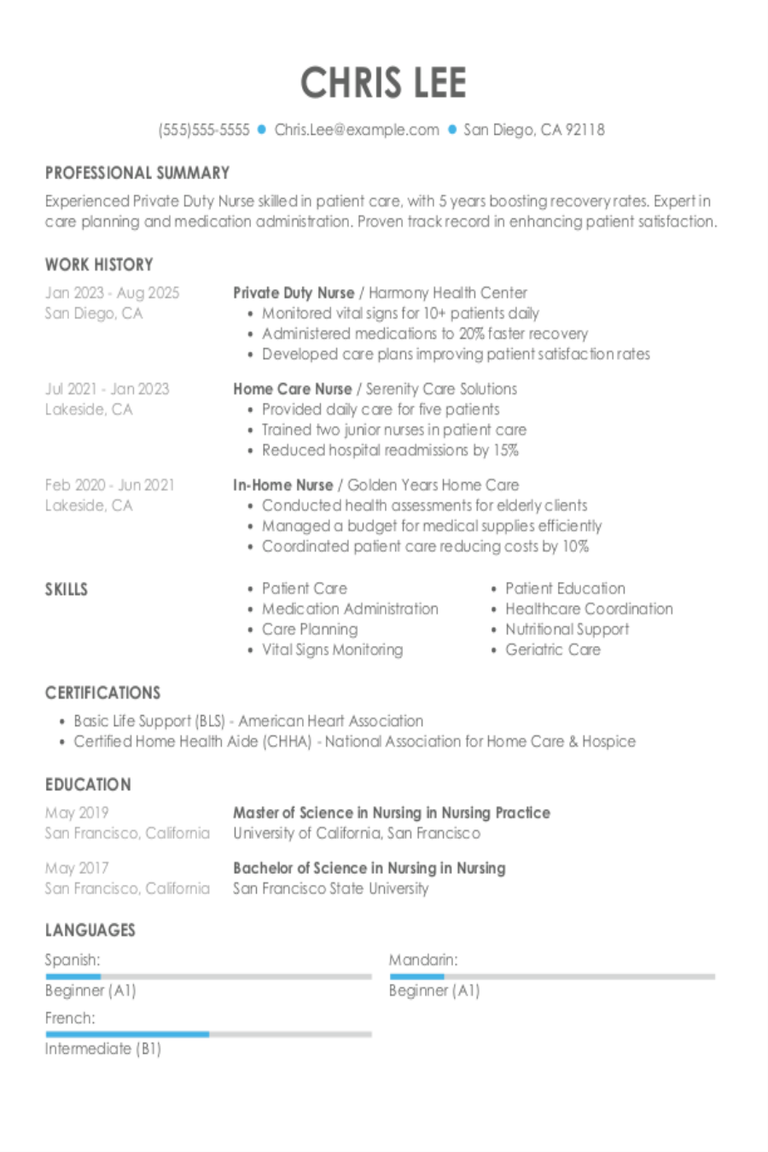
Private Duty Nurse Resume Examples & Templates
As a private duty nurse, your resume should focus on personalized care, patient advocacy, and strong communication skills. Learn how to highlight your ability to provide one-on-one support and manage
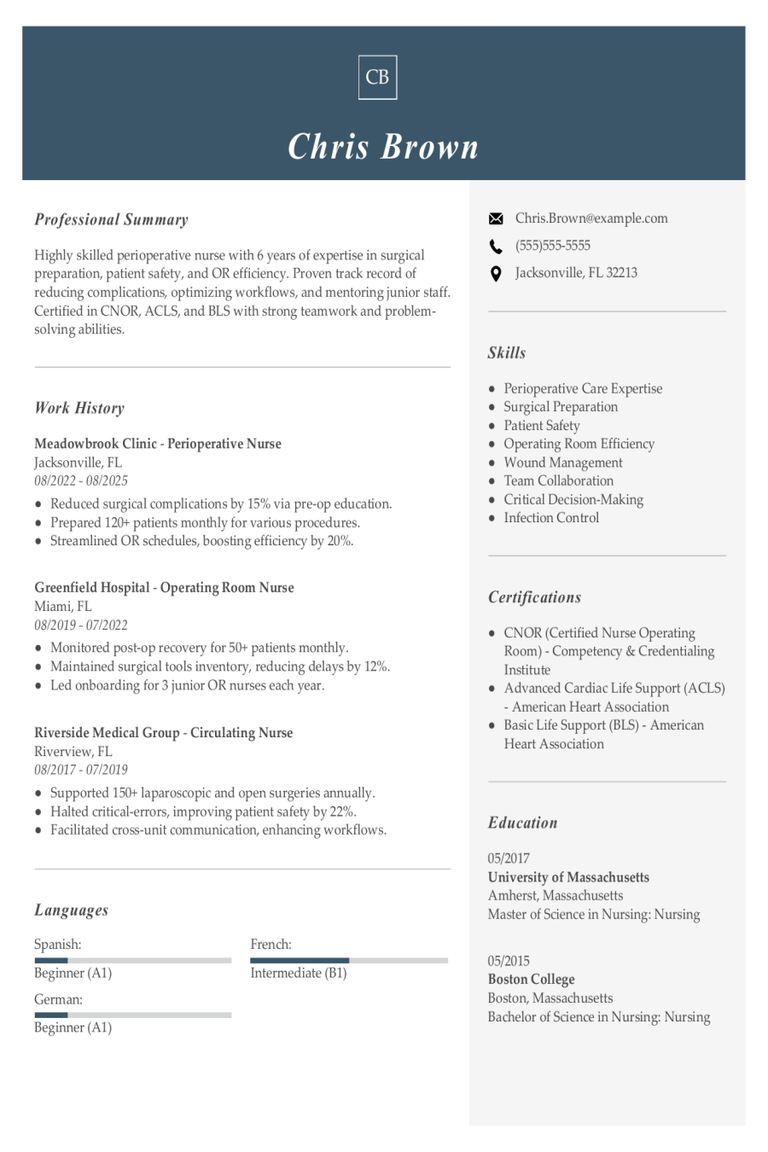
Perioperative Nurse Resume Examples & Templates
Explore perioperative nurse resumes that emphasize patient care, teamwork, and surgical support. Learn how to showcase your skills and experience to impress hiring teams in the healthcare field.Build my resumeImport
